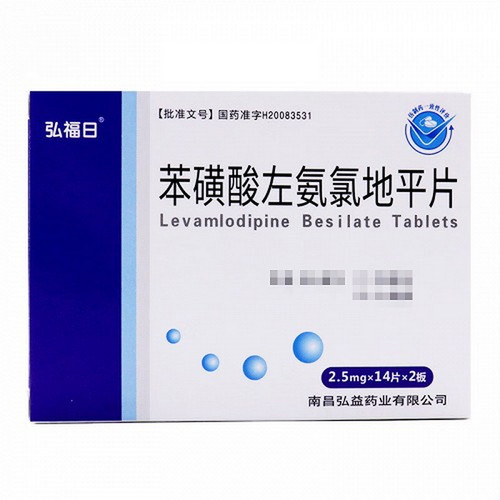Product Overview
[Drug Name]
Generic Name: Levoamlodipine Besylate Tablets
Trade Name: FuSiDuo Levoamlodipine Besylate Tablets 2.5mg*30 Tablets
[Main Ingredients]
The main ingredient of this product is levamlodipine besylate.
[Indications/Main Functions]
1. Hypertension.
2. Angina pectoris.
[Specifications]
2.5mg*30 tablets
[Dosage and Administration]
Oral:
1. The initial dose for the treatment of hypertension and angina pectoris is 2.5mg once daily. The dose may be increased based on the patient's clinical response, up to a maximum of 5mg once daily.
2. No dose adjustment is required when this product is used in combination with thiazide diuretics, beta-blockers, and angiotensin-converting enzyme inhibitors.
[Adverse Reactions]
This product is well tolerated within the 10 mg/day dose range, with most adverse reactions being mild to moderate. Discontinuation due to adverse reactions was only 1.5%, not significantly different from placebo (approximately 1%). The most common adverse reactions were headache and edema. Dose-related adverse reactions with an incidence of 1% were edema, dizziness, hot flashes, and palpitations. Adverse reactions with unclear dose relationships but an incidence exceeding 1.0% were headache, fatigue, nausea, abdominal pain, and somnolence. Among these adverse reactions, edema, hot flashes, palpitations, and somnolence were more common in women than in men. The following adverse events occurred at a rate (1% but 0.1% for which a causal relationship to the drug was unclear): General: allergic reaction, asthenia, back pain, hot flashes, malaise, pain, stiffness, weight gain; Cardiovascular: arrhythmia (including tachycardia, bradycardia, or atrial fibrillation), chest pain, hypotension, peripheral ischemia, syncope, postural dizziness, orthostatic hypotension, and vasculitis; Central and Peripheral Nervous System: hypoesthesia, peripheral neuropathy, paresthesia, tremor, vertigo; Gastrointestinal: anorexia, constipation, dyspepsia , dysphagia, diarrhea, flatulence, pancreatitis, vomiting, gingival hyperplasia; musculoskeletal system: joint pain, arthritis, muscle cramps, myalgia; mental: sexual dysfunction, insomnia, tension, depression, nightmares, anxiety, depersonalization; skin and appendages: angioedema, erythema, itching, rash, maculopapular rash; special senses: visual abnormalities, conjunctivitis, diplopia, eye pain, tinnitus; urinary system: frequent urination, urination disorder, nocturia; autonomic nervous system: dry mouth, night sweats; metabolism and nutrition: hyperglycemia, Thirst; Hematopoietic system: leukopenia, purpura, thrombocytopenia. The incidence of the following adverse events (0.1%): heart failure, irregular pulse, premature contraction, skin discoloration, urticaria, dry skin, dermatitis, alopecia, muscle weakness, twitching, ataxia, hypertonia, migraine, cold and clammy skin, apathy, agitation, amnesia, gastritis, increased appetite, loose stools, cough, rhinitis, dysuria, polyuria, parosmia, taste disturbance, visual accommodation disorder, dry eye syndrome. Other occasional reactions such as Myocardial infarction and angina pectoris cannot be distinguished as drug effects or disease states. Routine laboratory tests showed no significant changes, including no significant changes in serum potassium, blood glucose, total triglycerides, total cholesterol, high-density lipoprotein (HDL), uric acid, blood urea nitrogen, or creatinine. Since the drug's launch, occasional reports of gynecomastia have occurred in patients taking the drug, but the causal relationship with the drug is unclear. In some cases, jaundice and elevated liver enzymes (often accompanied by bile accumulation and hepatitis) have been severe, requiring hospitalization.
[Contraindications] Contraindications]
Levoamlodipine besylate tablets are contraindicated in patients allergic to dihydropyridine calcium channel blockers.
[Drug Interactions]
Clinical studies have not demonstrated that elderly patients respond differently to this drug than younger patients. However, given that elderly patients often have impaired liver, kidney, and heart function, as well as other medical conditions and medications, the lower end of the initial dose range is generally used. Elderly patients experience decreased clearance of levamlodipine besylate tablets, with an increase in the area under the curve (AUC) of approximately 40%-60%, necessitating a lower initial dose.
[Precautions]
(1) Angina and/or Myocardial Infarction: Rare. Patients with severe obstructive coronary artery disease may experience an increase in the frequency, duration, and/or severity of angina attacks, or the development of acute myocardial infarction, when initiating or increasing the dose of calcium channel blockers. The mechanism is unknown. (2)Hypotension: Since levamlodipine besylate tablets gradually produce vasodilation effects, acute hypotension rarely occurs after oral administration. However, caution should still be exercised when this product is used in combination with other peripheral vasodilators, especially in patients with severe aortic valve stenosis.
(3) Patients with heart failure: Calcium channel blockers should be used with caution in patients with heart failure.
(4) Patients with hepatic insufficiency: This product should be used with caution in patients with severe hepatic insufficiency.
(5) Patients with renal failure: The starting dose for patients with renal failure can remain unchanged.
(6) Discontinuation of β-blockers: This product has no protective effect against rebound symptoms caused by sudden discontinuation of β-blockers. Therefore, the dose should still be gradually reduced when discontinuing β-blockers.
(7) Levoamlodipine besylate tablets can be used safely in patients with obstructive lung disease, well-compensated heart failure, peripheral vascular disease, diabetes, and lipid disorders.








